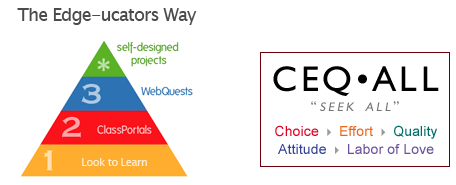I recently did a Webinar on this topic. Which is a bit absurd, really, because each deserves not only its own Webinar, but a full course to do justice to the ideas, models and research. But the point of the Webinar was to stimulate thinking in a couple areas:
- to see that a shift toward Intrinsic Motivation IS possible and robustly supported by rich pedagogies, and
- these pedagogies, when used in harmony, actually create synergies that maximise their benefits.
So the purpose of this post is to provide links to resources that people can pursue to learn more about each of the pedagogies. As the graphic below suggests, there are LOTS more than 5 great pedagogies and many more than are shown here. My goal was to choose a reasonable number and play with how they can be integrated. You can access a recording of the Webinar if you are interested.

Self Determination Theory – Intrinsic Motivation
- Why we Do What we Do – by Edward L. Deci and Richard Flaste
- Self-Determination Theory (Intrinsic Motivation) (Deci & Ryan) (or Daniel Pink’s animated version)
- Drive: The surprising truth about what motivates us – Daniel Pink’s Drive Animation
- Ryan, R. M., & Deci, E. L. (2000). Intrinsic and extrinsic motivations: Classic definitions and new directions. Contemporary Educational Psychology, 25, 54-67. (PDF)
Positive Psychology – Personal Meaning, Flow & Grit
Web sites & Resources
- The Original Theory: Authentic Happiness, by Martin Seligman
- Positive Psychology Theory: PERMA (Seligman)
- Flow (Csikszentmihalyi)
- Grit: The Power of Passion and Perseverance, TED Talk – Angela Duckworth
Books
- Flourish: A Visionary New Understanding of Happiness and Well-being – Martin Seligman
- Flow: The Psychology of Optimal Experience – Mihaly Csikszentmihalyi
Understanding by Design™ – Deep Learning
Using backward design, does your school have a continuum of rich performance tasks that validate the vision and prompt interdisciplinary demonstrations of students’ understandings that require their transfer to new contexts?
Web sites & Resources
- Understanding by Design – Wiggins and McTighe (research base)
- UbD Unit Template version 1
- UbD Unit Template 2.0
- Backward Design for Forward Action – and article by Jay McTighe
- Characteristics of a Performance Task – McTighe and Defined STEM
- Schooling by Design – Wiggins and McTighe
- Grant Wiggins’ post on Genuine vs Bogus Essential Questions
- Enduring Understanding Rationale and Checklist (pdf)
Books
- Understanding By Design (Expanded 2nd edition). Wiggins, G. and McTighe, J. (2005). Association for Supervision and Curriculum Development (ASCD)
- Understanding By Design Professional Development Workbook. McTighe, J. and Wiggins, G. (2004). Association for Supervision and Curriculum Development (ASCD)
- Understanding by Design Guide to Creating High Quality Units. Wiggins, G. and McTighe, J. (2011). Association for Supervision and Curriculum Development (ASCD)
- Understanding by Design Guide to Advanced Concepts in Creating and Reviewing Units. Wiggins, G. and McTighe, J. (2012). Association for Supervision and Curriculum Development (ASCD)
- Schooling By Design: Mission, Action, Achievement. Wiggins, G. and McTighe, J. (2007). Association for Supervision and Curriculum Development (ASCD)
- Essential Questions: Opening Doors to Student Understanding. McTighe, J. and Wiggins, G. (2013). Association for Supervision and Curriculum Development (ASCD)
Cultures of Thinking – Thinking Routines
Web sites & Resources
- Cultures of Thinking (Ritchhart, et. al.)
- Introduction to Thinking Routines – from the Visible Thinking / Project Zero Web site
- Look to Learns: Samples, About, stream (and the Thinking Routines / Prompts Page)
Books
- Making Thinking Visible: How to Promote Engagement, Understanding, and Independence for All Learners, by Ron Ritchhart, Mark Church, Karin Morrison
SOLE – Self-Organised Learning Environments
Websites & Resources
- Self-Organizing Learning Environments (SOLE) (Mitra)
- Download the SOLE Tool Kit
Videos
- The Child-driven Education – TED Talk – 2010
- Build a School in the Cloud – TED Talk 2013







